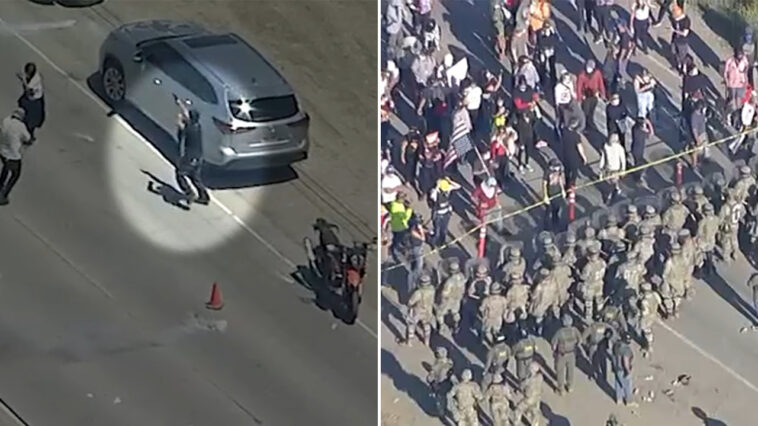A large-scale immigration raid conducted by federal agents at two Glass House Farms cannabis facilities in Southern California transpired on July 10, leading to the apprehension of nearly 200 individuals. This event triggered vehement public demonstrations, charges of misconduct, and an escalating political response. Dr. Jonathan A. Caravello, a prominent activist and academic, was among the captured, which prompted the public to rally for his immediate liberation. The incident was marked by conflict between the protesters and the agents, with the latter employing rubber bullets and tear gas.
The coordinated assault on the cultivation sites, directed by the US Department of Homeland Security, was supported by the Immigration and Customs Enforcement (ICE), the U.S. National Guard, and local law enforcement teams. What started as a simple workplace investigation quickly morphed into a heavily militarized campaign against immigrant workers and their allies. This perspective was reinforced by numerous witnesses and human rights organizations.
The raid took a tragic turn when a worker plummeted several stories during the turmoil, initially feared to have been killed. Subsequent news confirmed the worker to be gravely injured. In the aftermath of the incident, at least eight individuals were transferred to nearby hospitals for treatment, with an additional four assisted at the location. The authorities have yet to disclose the identities of the injured.
The California Faculty Association issued a resounding statement denouncing what they referred to as the kidnap of community members, characterizing these actions as an assault on the constitutional right to freedom of speech. They asserted that such reprisals against union representatives or anybody raising a voice against unfair actions are unacceptable. The union leaked news that Dr. Caravello is detained at the Ventura Federal Detention Center with a bail set at $1 million. As of the previous Friday evening, no formal charges had been publicly filed.
The union also expressed grave concern about the status of the other detained members, remarking on the alarm caused by their constantly unknown whereabouts. Close to 500 community members congregated throughout the day to demonstrate their objection to the onslaught. Protesters attempted to form human roadblocks and stop vehicles departing the site. However, their efforts often met with strong resistance, as federal agents discharged less-lethal munitions at the crowd.
Shocking video footage suggested the escalation of the confrontation, showing a protestor discharging a firearm after smoke canisters were thrown by the agents. This alarming development instigated an FBI inquiry into the shooting incident. At the Camarillo facility, ten minors without proper documentation were identified, including eight who were unaccompanied, leading to an investigation into potential violations of child labor laws.
The uncovering of the minors intensified scrutiny on labor conditions at legal cannabis operations and ignited debates on enforcement priorities. Cesar Ortiz, a family member of one of the detained workers, shed light on the inhumane conditions endured by many workers, who were kept in overheated shipping containers lacking air conditioning.
Beyond just highlighting the workers’ plight, Ortiz expressed the injustice faced by the laborers, who, according to him, were all pursuing their dreams. Statements from an unidentified authority disclosed that even U.S. citizens were not spared from detainment, intensifying the sense of indiscriminately applied justice. It was reported that all persons working within the facility were held, without regard for their citizenship status.
Government officials quickly voiced criticism of the harsh tactics employed. One elected official who was blocked from accessing the site characterized the agents’ blocking attempts as overkill and excessive, warning that such measures could spur further conflict. He claimed to have identified himself as a Congress member conducting oversight but was directed to get in touch with the ICE headquarters instead.
A representative from a regional labor and social justice outfit took exception to the aggressive tactics, arguing that there was no substantial case to justify them as a response to the relatively small crowd in a remote agricultural area. This comes on the heels of an uptick in immigration raids targeting the operation base since the beginning of June.
The operation’s far-reaching impact extended beyond the workplaces, unsettling local establishments. State universities in the periphery were compelled to switch classes online and allow remote work due to the instigated new measures. An official condemned these actions, accusing them of causing undue distress and harm.
The official further promised to continue working with the Attorney General and the Governor’s office to seek possible legal solutions to these activities. Critics are also questioning the logic behind targeting one of the state’s most prominent licensed cannabis cultivators as the Glass House Farms operation site.
The company briefly responded, acknowledging ICE’s search warrant execution and confirmed their willingness to comply fully. However, tensions show no signs of easing as federal authorities hint at further clampdowns. A U.S. Attorney issued an online warning stating that those caught interfering would be faced with federal charges.
For many across the state and in the directly affected county, the raid signifies a broader concern regarding potential threats to democratic freedoms and the human impact of politically motivated enforcement. This sentiment was echoed in a statement by an association which warned of the potential risk to public servants and looming uncertainty for their region and its next generation if safety cannot be ensured.
In the face of the fallout from the incident, these words serve as a sobering reminder of the dyamic between democractic liberties and the enforcement of immigration laws. They underscore the difficult challenges that lie ahead in navigating the immediate crisis and addressing the longer-term implications for those detained and the broader community.

